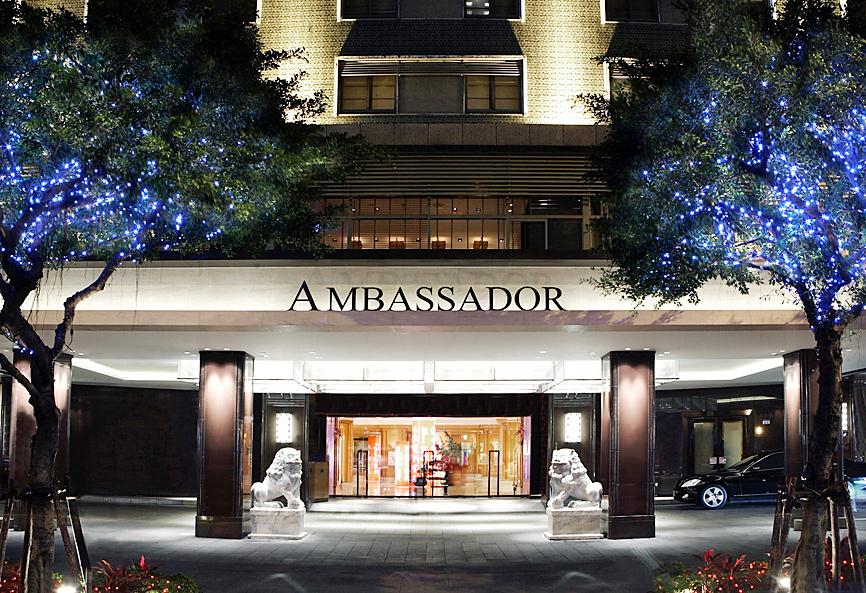Ambassador Hotels and Restaurants (國賓飯店) on Tuesday approved plans to seek urban renewal for its property in Kaohsiung, following a similar move last year for its flagship hotel in Taipei to cope with a business slowdown caused by the COVID-19 pandemic, the company said in a regulatory filing.
The hospitality provider, which ceased guestroom operations at Ambassador Hotel Taipei (台北國賓飯店) in July, said the 40-year-old Ambassador Hotel Kaohsiung (高雄國賓飯店) has been hit hard by border controls and social distancing measures.
Urban renewal would allow both properties to boost their floor area and value, the filing said.

Photo courtesy of Ambassador Hotels and Restaurants
Ambassador Hotel Taipei sits on a 1,454 ping (4,807m2) plot, making it the largest renewal project so far by measure of area, it said, adding that the company plans to build three high-rise buildings connected via the lower floors at the site.
One building would be reserved as an upscale hotel and the other two would house 76 luxury apartments, it added.
The company said it intends to invite Japan’s Palace Hotel Tokyo to operate the planned hotel in Taipei upon its completion and the two sides would sign a management contract in January next year.
Japanese travelers accounted for 70 percent of the clientele at Ambassador Hotel Taipei prior to the COVID-19 pandemic, the firm said.
The company said it would temporarily move its Cantonese and Szechuan restaurants, as well as its Michelin-starred A Cut Steakhouse at Ambassador Hotel Taipei, to a new mixed-use complex on Liaoning Street in February or March next year.
The company also owns Ambassador Hotel Hsinchu (新竹國賓飯店), whose operations have been unaffected, it added.
The company reported losses of NT$51.68 million (US$1.86 million) in the first three quarters of this year, or losses of NT$0.14 per share, company data showed.

AI SERVER DEMAND: ‘Overall industry demand continues to outpace supply and we are expanding capacity to meet it,’ the company’s chief executive officer said Hon Hai Precision Industry Co (鴻海精密) yesterday reported that net profit last quarter rose 27 percent from the same quarter last year on the back of demand for cloud services and high-performance computing products. Net profit surged to NT$44.36 billion (US$1.48 billion) from NT$35.04 billion a year earlier. On a quarterly basis, net profit grew 5 percent from NT$42.1 billion. Earnings per share expanded to NT$3.19 from NT$2.53 a year earlier and NT$3.03 in the first quarter. However, a sharp appreciation of the New Taiwan dollar since early May has weighed on the company’s performance, Hon Hai chief financial officer David Huang (黃德才)

The Taiwan Automation Intelligence and Robot Show, which is to be held from Wednesday to Saturday at the Taipei Nangang Exhibition Center, would showcase the latest in artificial intelligence (AI)-driven robotics and automation technologies, the organizer said yesterday. The event would highlight applications in smart manufacturing, as well as information and communications technology, the Taiwan Automation Intelligence and Robotics Association said. More than 1,000 companies are to display innovations in semiconductors, electromechanics, industrial automation and intelligent manufacturing, it said in a news release. Visitors can explore automated guided vehicles, 3D machine vision systems and AI-powered applications at the show, along

FORECAST: The greater computing power needed for emerging AI applications has driven higher demand for advanced semiconductors worldwide, TSMC said The government-supported Industrial Technology Research Institute (ITRI) has raised its forecast for this year’s growth in the output value of Taiwan’s semiconductor industry to above 22 percent on strong global demand for artificial intelligence (AI) applications. In its latest IEK Current Quarterly Model report, the institute said the local semiconductor industry would have output of NT$6.5 trillion (US$216.6 billion) this year, up 22.2 percent from a year earlier, an upward revision from a 19.1 percent increase estimate made in May. The strong showing of the local semiconductor industry largely reflected the stronger-than-expected performance of the integrated circuit (IC) manufacturing segment,

COLLABORATION: Softbank would supply manufacturing gear to the factory, and a joint venture would make AI data center equipment, Young Liu said Hon Hai Precision Industry Co (鴻海精密) would operate a US factory owned by Softbank Group Corp, setting up what is in the running to be the first manufacturing site in the Japanese company’s US$500 billion Stargate venture with OpenAI and Oracle Corp. Softbank is acquiring Hon Hai’s electric-vehicle plant in Ohio, but the Taiwanese company would continue to run the complex after turning it into an artificial intelligence (AI) server production plant, Hon Hai chairman Young Liu (劉揚偉) said yesterday. Softbank would supply manufacturing gear to the factory, and a joint venture between the two companies would make AI data